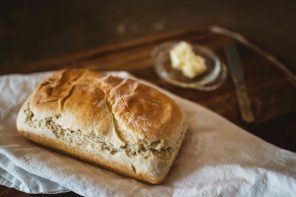I returned home from work the other day to find my 3-year old son, Christian, hard at work at the kitchen table with a set of markers. I looked over his shoulder at the paper below him and saw black splotches. He hasn’t yet grasped the idea of painting inside the lines much less actually drawing something that is clear, so all the colors get mixed together. So I asked him, “Christian, what are you making?” He looked up at me as if to say, “Isn’t it obvious?” then looked back down. He said, “A picture,” under his breath. So I asked the next obvious question: “What’s it a picture of?” Christian responded, “Picture of you.” I turned my head, trying to find myself in that picture as he finished it up and handed it to me with a huge smile on his face. And we took the black splotches of markers and hung it on our refrigerator. I walk by and look at it and am filled with a sense of pride, not because it’s a great picture, but because it’s the best picture he could do. And he gave it to me.
It makes me think a bit of the scene in Luke 9 when the disciples were confronted with an insurmountable issue:
When the apostles returned, they reported to Jesus what they had done. Then he took them with him and they withdrew by themselves to a town called Bethsaida, but the crowds learned about it and followed him. He welcomed them and spoke to them about the kingdom of God, and healed those who needed healing. Late in the afternoon the Twelve came to Him and said, “Send the crowd away so they can go to the surrounding villages and countryside to find food and lodging, because we are in a remote place” (Luke 9:10-13).
What complicated the problem even more was the other circumstances that the disciples found themselves. Just before this, they had been out working. Working hard. Jesus had sent them out on a mission trip of their own, and they had gone throughout the entire region to preach and to heal the sick. They were coming back from those long days and experiences, and they were tired. The situation was overwhelming.
Overwhelming for everyone, that is, except another character that enters the story. John includes this character in his account though Luke makes no mention of him. This character saw the same situation that the disciples did, but he reacted differently. Perhaps he reacted so differently because even though the facts of the situation remained the same, he saw them through different eyes. The new character is a little boy, a child, with even less to offer than the disciples. And yet his perspective on the situation was radically different than his older counterparts. John records it in chapter 6, verse 9: “Here is a boy with five small barley loaves and two small fish, but how far will they go among so many?”
And so this little boy with five barley loaves and two fish did the one thing that the disciples never in their infinite wisdom thought to do. In all their strategy and their frustration about their own inability to affect any sort of change in their situation, they neglected to do what was implicit to this little boy: they never once thought to give what they had to Jesus.
It’s funny how as you grow your capacity for trust diminishes. As kids we are just naïve enough to think that our loaves and fish can do some good. We are just silly enough to think that our pathetic little picture can actually make our daddy smile. But as we grow, we become hardened by life and its situations to the point where if I wanted to give my dad a gift now, I would spend hours obsessing over whether or not it was good enough. Likewise, I know there will come a time when Christian doesn’t bring his drawings to me any more, because someday he will recognize them as just black splotches. But not yet, and not with this boy either.
He was too young to realize that what he had to give was pointless in the face of the problem. He was too naïve to recognize the seriousness of the issue and the smallness of his solution to it. He foolishly brought what he had with a smile on his face, with no self-consciousness about it all, and he gave it.
But perhaps in that moment, what was needed more than anything else—more than food, more than money, more than adequate resources, was a willingness to give what we have to our Father, regardless of how pathetic it looks, because we trust in Him and His ability more than our own answers to the problems of the world. Small acts of courageous faith can have miraculous results.
The disciples’ job was to be the conduit of the work of Jesus. That was their responsibility, and that is ours. It is to throw our pathetic black splotches of effort onto the paper and entrust it to our Father to do with it what only He can do. You do something; and do it like a child. You can choose to embrace the foolishness of this child and give what you have and do what you can do, and trust Jesus with the rest. The boy gave, and Jesus, taking the traditional posture of Jewish prayer, looked up into heaven and multiplied. And as the disciples began to hand out the bread, more and more miraculously showed up. The fish, too, and at the end of the day, there were baskets left over. All from this pathetic attempt to solve an insolvable problem. Small acts of courageous faith, acts of seemingly insignificant proportions, can have miraculous results.
And maybe, just maybe, there is a cosmic refrigerator somewhere where another loving Daddy tacks up the miserable black splotches of His kids. Maybe hanging on that refrigerator is a slingshot that was far too small to change a giant. Maybe hanging there are two small coins that a lowly woman gave away that were not worth much to anyone else. Maybe there are the nets that some insignificant fisherman dropped to follow a traveling preacher. And maybe there is a list of 95 things wrong with the church that a monk nailed to a church door a long time ago. Maybe there is some uneaten food that a female missionary pushed aside because the people of China were starving. And maybe there is a spot waiting for your efforts, small though they maybe, but when offered in faith can become through which God multiplies His work.
Subscribe to MichaelKelley.co
Never miss a new post. Subscribe to receive these posts in your inbox and to receive information about new discipleship resources.





Christian did better than staying “inside the lines.”
“I see…[enthusiastically insert what you see] circles & circles & circles!” or, lines going this way & this way & this way! or, red & blue & green!”
I think the Lord Jesus works best with blank papers instead of trying to work within somebody’s lines.
Love how Christian’s gift of his experiment with markers made you see a Bible event.